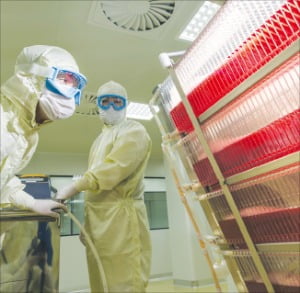
GC Green Cross employees are inspecting the production line at the vaccine factory in Hwasun, Jeollanam-do. GC Green Cross provided
It is highly likely that the GC Green Cross will take over the production of the Corona 19 vaccine developed by Russia. It depends on whether Russian development officials visiting Korea on the 20th will judge that the production facilities of Green Cross are’sufficient to entrust CMO’. It is analyzed that if the Green Cross wins, it will generate additional sales of hundreds of billions of dollars per year.
○ Contracted with Russia’s largest vaccine company
According to the bio industry on the 17th, officials from the Russian Federation Chumakov Immunobiology Research and Development Center, who developed the COVID-19 vaccine,’covivac’, and a government official will visit Korea on the 20th. A representative of Russian Smart Biotech, which was established to sell vaccines, is also coming. From the 23rd, they plan to visit the Green Cross Hwasun Plant and Ochang Plant, and the Animal Cell Demonstration Support Center in Andong, Gyeongbuk to check whether it is suitable for the production of Kobi Bak.
Founded in 1957, the Chumakov Institute is Russia’s largest vaccine development agency that supplies vaccines to the World Health Organization (WHO) and UNICEF. It distributes self-developed polio vaccines to Europe, Africa, and Southeast Asia. Kobibak, developed by this institute since April last year, showed a maximum immunity rate of 95% in phase 2 clinical trials conducted on volunteers. Currently, phase 3 clinical trials are in progress. As the Russian government approved the use of Kobivac last month, the Russian-made COVID-19 vaccine has been expanded to three, including Sputnik V and Epivaccorona.

Kobibak is a dead vaccine (inactivated vaccine) that stimulates the body’s immune system by putting a’dead’ virus that has the same structure as the Corona 19 virus. It is a way to train the immune cells in the body to produce antibodies against the Corona 19 virus. It is non-toxic and has few side effects because it contains a dead vaccine. Hepatitis A, flu, polio, and rabies vaccines are also made into dead vaccines. However, compared to the protein recombination method in which a living virus is put into the body, it has a disadvantage that the duration is shorter.
○100 million doses produced… Expected to sell hundreds of billions of dollars
When the Green Cross is selected as a production base for Kobibak, this quantity will be exported along with Russia to the Union of Independent States (CIS), which includes nine countries, including Kazakhstan, Uzbekistan, and others. Overseas distribution is handled by Cellmatera Futics, a domestic bio company.
It is known that Kobibak has already received orders for about 300 million doses (bottles) from Russia and CIS countries. It is known that the production volume in Korea will amount to 100 million DOS. An industry official said, “The Russian side wanted to entrust more, but we know that the production facilities such as the Green Cross are full, reaching the level of 100 million DOS.”
Green Cross is known to have proposed a plan to take charge of both the production and the finalization process of the vaccine. The production of undiluted solutions is handled by the Green Cross Hwasun Plant. The finished process of putting the undiluted solution into a syringe, etc. is carried out at the Ochang factory in Chungbuk. It can produce up to 1 billion doses per year on the assumption that it operates 8 hours a day. An industry insider predicted, “If the Green Cross wins the original amount and the finished process, the operating margin will reach 50%.”
The industry believes that there is a possibility that the Russian side, Green Cross, and Cellatherapeutics, will first sign a technology transfer contract during this visit to Korea. This contract is expected in the middle of next month. It is said that the specific unit price and contract size will also be discussed at this visit.
Reporter Kim Woo-seop [email protected]
Ⓒ Hankyung.com prohibits unauthorized reproduction and redistribution
